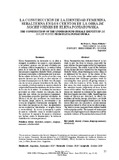La construcción de la identidad femenina subalterna en los cuentos de la obra De noche vienes de Elena Poniatowska

View/
Date
2020Author
Palabras Clave
Identidad, Mujeres, Lenguaje, Memoria, SubalternidadIdentity, Women, Language, Memory, Subalternity
Metadata
Show full item recordAbstract
Elena Poniatowska ha dedicado en su obra a
otorgarle la palabra a las mujeres, especialmente
a las pobres, quienes son las más olvidadas por
el sistema cultural hegemónico. La autora forma
parte de la tradición de la literatura no-fi ccional
iniciada por el argentino Rodolfo Walsh, al trabajar
los temas silenciados o deformados por la prensa.
En los relatos del texto De noche vienes hace una
apuesta literaria que desafía su obra anterior al
ejecutar el mismo proceso de darle voz a la mujer
con los recursos propios del relato de fi cción. En
ese sentido, el trabajo analiza la construcción de la
subjetividad femenina subalterna de dichos relatos
de fi cción de la autora. Se analizan las tensiones
presentes en estos cuentos en relación con la
opresión que sufren sus personajes femeninos.
Se bosquejan pequeños pueblos olvidados de
México en los que perduran las tradiciones
de familia, linaje, herencia, servidumbre y las
creencias religiosas fuertemente arraigadas. En
los relatos hay prejuicios de clase, desigualdades
socioeconómicas vinculadas al origen étnico
o sociocultural. Se recrea la memoria a partir
de marcas culturales como la oralidad popular.
Se construye la memoria de mujeres anónimas
que luchan contra la dominación y la violencia
simbólica del sistema patriarcal.
Collections
Información Adicional
| Otros Títulos | The construction of the underground female identity in De noche vienes from Elena Poniatowska |
| Correo Electrónico | revistacifranueva@gmail.com fdimare@gmail.com |
| Editor | SaberULA |
| ISSN Electrónico | 2244-8438 |
| Resumen en otro Idioma | Elena Poniatowska has dedicated herself in her work to give the fl oor to women, especially the poor, who are the most neglected by the hegemonic cultural system. The author is part of the tradition of non-fi ction literature initiated by the Argentine Rodolfo Walsh, when working on issues silenced or deformed by the press. In the stories of the text De noche vienes, the author makes a literary commitment that challenges previous work by executing the same process of giving women a voice with the resources of the fi ction story. In that sense, the work analyzes the construction of the subaltern female subjectivity of these fi ction stories of the author. The tensions present in these stories are analyzed in relation to the oppression that their female characters suff er. Small forgotten towns of Mexico are sketched, in which the traditions of family, lineage, inheritance, servitude and strongly rooted religious beliefs persist. In the stories there are class prejudices, socioeconomic inequalities linked to ethnic or sociocultural origin. The story recreates memory from cultural brands such as popular orality. The memory of anonymous women who fi ght against male domination and the symbolic violence of the patriarchal system is built. |
| Colación | 35-44 |
| Periodicidad | Semestral |
| Página Web | http://www.saber.ula.ve/cifranueva/ |
| País | Venezuela |
| Institución | Universidad de Los Andes |
| Sección | Cifra Nueva: Artículos |





